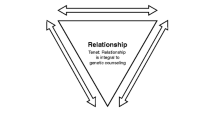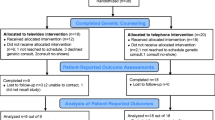Abstract
Growing demand for and limited geographic access to genetic counseling services is increasing the need for alternative service delivery models (SDM) like telephone genetic counseling (TGC). Little research has been done on genetic counselors’ perspectives of the practice of TGC. We created an anonymous online survey to assess whether telephone genetic counselors believed the tasks identified in the ABGC (American Board of Genetic Counseling) Practice Analysis were performed similarly or differently in TGC compared to in person genetic counseling (IPGC). If there were differences noted, we sought to determine the nature of the differences and if additional training might be needed to address them. Eighty eight genetic counselors with experience in TGC completed some or all of the survey. Respondents identified differences in 13 (14.8 %) of the 88 tasks studied. The tasks identified as most different in TGC were: “establishing rapport through verbal and nonverbal interactions” (60.2 %; 50/83 respondents identified the task as different), “recognizing factors affecting the counseling interaction” (47.8 %; 32/67), “assessing client/family emotions, support, etc.” (40.1 %; 27/66) and “educating clients about basic genetic concepts” (35.6 %; 26/73). A slight majority (53.8 %; 35/65) felt additional training was needed to communicate information without visual aids and more effectively perform psychosocial assessments. In summary, although a majority of genetic counseling tasks are performed similarly between TGC and IPGC, TGC counselors recognize that specific training in the TGC model may be needed to address the key differences.
Similar content being viewed by others
References
Accreditation Council for Genetic Counseling. (2013). Practice-based competencies for genetic counselors. Retrieved from http://www.GCeducation.org/Documents/ACGCPracticeBasedCompetencies_13-Final-Web.pdf. Accessed 29 Apr 2014.
Baumanis, L., Evans, J. P., Callanan, N., & Susswein, L. R. (2009). Telephoned BRCA1/2 genetic test results: prevalence, practice, and patient satisfaction. Journal of Genetic Counseling, 18(5), 447–463. doi:10.1007/s10897-009-9238-8.
Bensend, T. A., McCarthy Veach, P., & Niendorf, K. B. (2013). What’s the harm? Genetic counselors’ perceptions of adverse effects of genetics service provision by non-genetics professionals. Journal of Genetic Counseling, 23, 48–63. doi:10.1007/s10897-013-9605-3.
Bonadies, D., Brierley, K. L., Barnett, R. E., Baxter, M. D., Donenberg, T., Ducaine, W. L., et al. (2014). Adverse events in cancer genetic testing: the third case series. Cancer Journal, 20(4), 246–253. doi:10.1097/PPO.0000000000000057.
Bradbury, A. R., Patrick-Miller, L., Fetzer, D., Egleston, B., Cummings, S. A., Forman, A., et al. (2011). Genetic counselor opinions of, and experiences with telephone communication of BRCA1/2 test results. Clinical Genetics, 79(2), 125–131. doi:10.1111/j.1399-0004.2010.01540.x.
Brierley, K. L., Campfield, D., Ducaine, W., Dohany, L., Donenberg, T., Shannon, K., et al. (2010). Errors in delivery of cancer genetics services: implications for practice. Connecticut Medicine, 4(7), 413–423.
Brierley, K. L., Blouch, E., Cogswell, W., Homer, J. P., Pencarinha, D., Stanislaw, C. L., et al. (2012). Adverse events in cancer genetic testing medical, ethical, legal, and financial implications. Cancer Journal, 18(4), 303–309. doi:10.1097/PPO.0b013e3182609490.
Butrick, M., Kelly, S., Peshkin, B. N., Luta, G., Nusbaum, R., Hooker, G. W., et al. (2014). Disparities in uptake of BRCA1/2 genetic testing in a randomized trial of telephone counseling. Genetics in Medicine. doi:10.1038/gim.2014.125. Advance online publication.
Chen, W. Y., Garber, J. E., Higham, S., Schneider, K. A., Davis, K. B., Deffenbaugh, A. M., et al. (2002). BRCA1/2 genetic testing in the community setting. Journal of Clinical Oncology, 20(22), 4485–4492. doi:10.1200/JCO.2002.08.147.
Cohen, S. A., Gustafson, S. L., Marvin, M. L., Riley, B. D., Uhlmann, W. R., Liebers, S. B., & Rousseau, J. A. (2012). Report from the National Society of Genetic Counselors service delivery model task force: a proposal to define models, components, and modes of referral. Journal of Genetic Counseling, 21(5), 645–651. doi:10.1007/s10897-012-9505-y.
Cohen, S. A., Marvin, M. L., Riley, B. D., Vig, H. S., Rousseau, J. A., & Gustafson, S. L. (2013). Identification of genetic counseling service delivery models in practice: a report from the NSGC service delivery model task force. Journal of Genetic Counseling, 22(4), 411–421. doi:10.1007/s10897-013-9588-0.
Genetests. (2015). Disorders for which genetic tests are available and laboratories offering tests, 1993–2015. Retrieved from https://www.genetests.org/img/content/chart1.png. Accessed 2 Apr 2015.
Graf, M. D., Needham, D. F., Teed, N., & Brown, T. (2013). Genetic testing insurance coverage trends: a review of publicly available policies from the largest US payers. Personalized Medicine, 10(3), 235–243. doi:10.2217/pme.13.9.
Hampel, H., Grubs, R. E., Walton, C. S., Nguyen, E., Breidenbach, D. H., Nettles, S., et al. (2009). Genetic counseling practice analysis. Journal of Genetic Counseling, 18(3), 205–216. doi:10.1007/s10897-009-9216-1.
Helmes, A. W., Culver, J. O., & Bowen, D. J. (2006). Results of a randomized study of telephone versus in-person breast cancer risk counseling. Patient Education and Counseling, 64(1–3), 96–103. doi:10.1016/j.pec.2005.12.002.
Hsieh, H. F., & Shannon, S. E. (2005). Three approaches to qualitative content analysis. Qualitative Health Research, 15(9), 1277–1288. doi:10.1177/1049732305276687.
Jenkins, J., Calzone, K. A., Dimond, E., Liewehr, D. J., Steinberg, S. M., Jourkiv, O., et al. (2007). Randomized comparison of phone versus in-person BRCA1/2 predisposition genetic test result disclosure counseling. Genetics in Medicine, 9(8), 487–495. doi: 10.1097GIM.0b013e31812e6220.
Kinney, A. Y., Butler, K. M., Schwartz, M. D., Mandelblatt, J. S., Boucher, K. M., & Pappas, L. M. (2014). Expanding access to BRCA1/2 genetic counseling with telephone delivery: a cluster randomized trial. Journal of the National Cancer Institute, 106(12), dju328. doi:10.1093/jnci/dju328.
Lee, J. (2013). Cigna requires genetic counseling. New policy aims to reduce inappropriate testing of at-risk patients. Modern Healthcare, 43(30), 4.
Moyer, V. A. (2014). Risk assessment, genetic counseling, and genetic testing for BRCA-related cancer in women: U.S. preventive services task force recommendation statement. Annals of Internal Medicine, 160(4), 271–281. doi:10.7326/M13-2747.
National Society of Genetic Counselors. (2014). 2014 professional status survey executive summary. Retrieved from http://nsgc.org/p/do/sd/sid=2475&type=0. Accessed 9 Oct 2014.
Peshkin, B. N., DeMarco, T. A., Graves, K. D., Brown, K., Nusbaum, R. H., Moglia, D., et al. (2008). Telephone genetic counseling for high-risk women undergoing BRCA1 and BRCA2 testing: rationale and development of a randomized controlled trial. Genetic Testing, 12(1), 37–52. doi: 10.1089=gte.2006.0525.
Platten, U., Rantala, J., Lindblom, A., Brandberg, Y., Lindgren, G., & Arver, B. (2012). The use of telephone in genetic counseling versus in-person counseling: a randomized study on counselees’ outcome. Familial Cancer, 11(3), 371–379. doi:10.1007/s10689-012-9522-x.
Sangha, K., Dircks, A., & Langlois, S. (2003). Assessment of the effectiveness of genetic counseling by telephone compared to a clinic visit. Journal of Genetic Counseling, 12(2), 171–184.
Schwartz, M. D., Valdimarsdottir, H. B., Peshkin, B. N., Mandelblatt, J., Nusbaum, R., Huang, A. T., et al. (2014). Randomized noninferiority trial of telephone versus in-person genetic counseling for hereditary breast and ovarian cancer. Journal of Clinical Oncology, 32(31), 618–626. doi:10.1200/jco.2013.51.3226.
Sutphen, R., Davila, B., Shappell, H., Holtje, T., Vadaparampil, S., Friedman, S., et al. (2010). Real world experience with cancer genetic counseling via telephone. Familial Cancer, 9(4), 681–689. doi:10.1007/s10689-010-9369-y.
U.S. Preventive Services Task Force. (2005). Genetic risk assessment and BRCA mutation testing for breast and ovarian cancer susceptibility: recommendation statement. Annals of Internal Medicine, 143(5), 355–361. doi:10.7326/0003-4819-143-5-200509060-00011.
U.S. Preventive Services Task Force. (2014). USPSTF A and B recommendations by date. Retrieved from http://www.uspreventiveservicestaskforce.org/uspstf/uspsdaterecs.htm. Accessed 31 Mar 2014.
Acknowledgments
We would like to thank Rawan Awwad, Whitney Ducaine and Kristen Rauch for their assistance with piloting this survey. We would also like to thank all the genetic counselors that took the time to complete our survey.
Conflict of Interest
Kelly R. Burgess and Angela Trepanier declare that they have no conflict of interest.
Erin P. Carmany has stock options and is a contractor for Informed Medical Decisions, Inc., a provider of telephone genetic counseling services.
Human Studies and Informed Consent
All procedures followed were in accordance with the ethical standards of the responsible committee on human experimentation (institutional and national) and with the Helsinki Declaration of 1975, as revised in 2000 (5). Informed consent was obtained from all patients for being included in the study.
Animal Studies
No animal studies were carried out by the authors for this article.
Author information
Authors and Affiliations
Corresponding author
Rights and permissions
About this article
Cite this article
Burgess, K.R., Carmany, E.P. & Trepanier, A.M. A Comparison of Telephone Genetic Counseling and In-Person Genetic Counseling from the Genetic Counselor’s Perspective. J Genet Counsel 25, 112–126 (2016). https://doi.org/10.1007/s10897-015-9848-2
Received:
Accepted:
Published:
Issue Date:
DOI: https://doi.org/10.1007/s10897-015-9848-2




